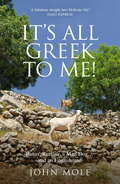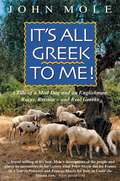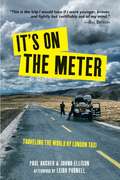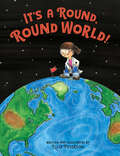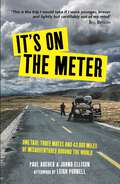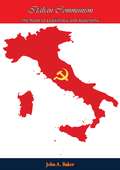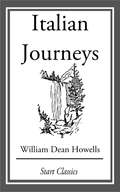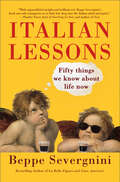- Table View
- List View
It Happened on the Oregon Trail (It Happened In Series)
by Tricia Martineau WagnerMany of the events that took place along the Oregon Trail are well known--the perils the Applegate family faced as they rafted down the raging Columbia River, the plight of the Donner Party as they found themselves snowbound and starving at Truckee Lake. But do you know the whole story?It Happened on the Oregon Trail reveals the stories of these well-known events as well as many lesser-known happenings, providing insights about the adventurous emigrants who, beginning in the 1840s, headed west in covered wagons in search of a better life. The hardships and the joys of the 2000-mile journey across plains, mountains, and deserts come alive in this entertaining and informative book.
It Happens in the Dark
by Carol O'ConnellMallory Book 11: the eleventh NYPD detective Kathy Mallory novel from New York Times bestseller Carol O'Connell, master of knife-edge suspense and intricate plotting.The reviews called it 'A Play to Die For' after the woman was found dead in the front row. The next night, there's another front-row death. Detective Kathy Mallory takes over, but no matter what she asks, no one seems to be giving her a straight answer. The only person - if 'person' is the right word - who seems to be clear is the ghostwriter. Every night, an unseen backstage hand chalks up line changes and messages on a blackboard. And the ghostwriter is now writing Mallory into the play itself, a play about a long-ago massacre that may not be at all fictional. 'MALLORY,' the blackboard reads, 'TONIGHT'S THE NIGHT. NOTHING PERSONAL.' If Mallory can't find out who's responsible, heads will roll. Unfortunately, one of them might be her own...
It Happens in the Dark: Kathy Mallory: Book Eleven
by Carol O'ConnellMallory Book 11: the eleventh NYPD detective Kathy Mallory novel from New York Times bestseller Carol O'Connell, master of knife-edge suspense and intricate plotting.The reviews called it 'A Play to Die For' after the woman was found dead in the front row. The next night, there's another front-row death. Detective Kathy Mallory takes over, but no matter what she asks, no one seems to be giving her a straight answer. The only person - if 'person' is the right word - who seems to be clear is the ghostwriter. Every night, an unseen backstage hand chalks up line changes and messages on a blackboard. And the ghostwriter is now writing Mallory into the play itself, a play about a long-ago massacre that may not be at all fictional. 'MALLORY,' the blackboard reads, 'TONIGHT'S THE NIGHT. NOTHING PERSONAL.' If Mallory can't find out who's responsible, heads will roll. Unfortunately, one of them might be her own...(P)2013 Recorded Books
It Seemed like a Good Idea at the Time: My Adventures in Life and Food
by Moira HodgsonThe daughter of a British Foreign Service officer, Moira Hodgson spent her childhood in many a strange and exotic land. She discovered American food in Saigon, ate wild boar in Berlin, and learned how to prepare potatoes from her eccentric Irish grandmother. Today, Hodgson has a well-deserved reputation as a discerning critic whose columns in the New York Observer were devoured by dedicated food lovers for two decades. A delightful memoir of meals from around the world--complete with recipes--It Seemed Like a Good Idea at the Time reflects Hodgson's talent for connecting her love of food and travel with the people and places in her life. Whether she's dining on Moroccan mechoui, a whole lamb baked for a day over coals, or struggling to entertain in a tiny Greenwich Village apartment, her reminiscences are always a treat.
It Started With Paris: The heartwarming bestseller of love, hope and new beginnings
by Cathy KellyIt all started with Paris . . .At the top of the Eiffel Tower, a young man proposes to his girlfriend - and in that second, everything changes - for the couple, but also for their families back in Ireland . . .Leila's been nursing a badly broken heart since her husband upped and left, but she's determined to put on a brave face for the bride. Vonnie, a widow and exceptional cake-maker, is just daring to let love back into her life, although someone seems determined to stop it. And head teacher Grace finds the impending wedding of her son means that she's spending more time with her ex-husband. After all those years apart, is it possible she's made a mistake?Fall in love this summer with a trip to Paris, from the heartwarming Sunday Times bestselling author.
It Started With Paris: The heartwarming bestseller of love, hope and new beginnings
by Cathy KellyThis edition features an interview with the author.It all started with Paris... At the top of the Eiffel Tower, a young man proposes to his girlfriend, cheered on by delighted tourists.With her trademark warmth and insight, Cathy Kelly weaves a delightful tale spinning out from this once-in-a-lifetime moment, drawing together a terrific cast of characters with stories of their own. Vonnie, a widow and exceptional cake-maker, is just daring to let love back into her life, but someone is determined to stop it.Leila, devotedly working for her boss, but realizing her devotion is turning to something more romantic. Grace, a divorced head-teacher, starting to wonder whether she faces a lifetime of being alone. The impending wedding of her daughter means that she's spending more time with her ex-husband. After ten years apart, is it possible she's made a mistake?Read by Olivia Caffrey(p) 2014 Orion Publishing Group
It Still Moves: Lost Songs, Lost Highways, and the Search for the Next American Music
by Amanda PetrusichIn “a terrific piece of travel writing” a music journalist and New Yorker staff writer “takes us on a tour through the roots of American rural music” (The Guardian).“Where lies the boundary between meaning and sentiment? Between memory and nostalgia? America and Americana? What is and what was? Does it move?” —Donovon Hohn, “A Romance of Rust”Part travelogue, part cultural criticism, part music appreciation, It Still Moves does for today’s avant folk scene what Greil Marcus did for Dylan and The Basement Tapes. Amanda Petrusich outlines the sounds of the new, weird America—honoring the rich tradition of gospel, bluegrass, country, folk, and rock that feeds it, while simultaneously exploring the American character as personified in all of these genres historically. Through interviews, road stories, geographical and sociological interpretations, and detailed music criticism, Petrusich traces the rise of Americana music from its gospel origins through its new and compelling incarnations (as evidenced in bands and artists from Elvis to Iron and Wine, the Carter Family to Animal Collective, Johnny Cash to Will Oldham) and explores how the genre is adapting to the twenty-first century. Ultimately the book is an examination of all things American: guitars, cars, kids, motion, passion, enterprise, and change, in a fervent attempt to reconcile the American past with the American present, using only dusty records and highway maps as guides.“Like a smart, genial Persephone, Amanda Petrusich wanders the underworld of American roots music and reports back her insights with an open mind and an open heart.” —Anthony DeCurtis, Rolling Stone“Sharply observed, intensely felt.” —Simon Reynolds, author of Rip It Up and Start Again: Postpunk 1978–84
It's All Chinese to Me
by Pierre Ostrowski Gwen PennerReady to gain insight into China in a fascinating way? It's All Chinese to Me is a comprehensive overview of Chinese culture that allows you to peer into what makes the Chinese people tick.Firsthand tips, insights and fun cartoon-like illustrations give you graphic impressions of the real China, and allow you to get a feel not only for what it's like, but how to survive the cultural differences. Covering everything from major influences and historical events that guide Chinese behavior to social idiosyncrasies that surprise most Westerners, It's All Chinese to Me helps demystify Chinese culture for Westerners.
It's All Chinese to Me
by Pierre Ostrowski Gwen PennerReady to gain insight into China in a fascinating way? It's All Chinese to Me is a comprehensive overview of Chinese culture that allows you to peer into what makes the Chinese people tick.Firsthand tips, insights and fun cartoon-like illustrations give you graphic impressions of the real China, and allow you to get a feel not only for what it's like, but how to survive the cultural differences. Covering everything from major influences and historical events that guide Chinese behavior to social idiosyncrasies that surprise most Westerners, It's All Chinese to Me helps demystify Chinese culture for Westerners.
It's All Chinese to Me
by Pierre Ostrowski Gwen PennerPicture yourself in China with this fun, graphic-novel inspired introduction to China, its culture and people!Ready to gain insight into Chinese culture in a fascinating way? This comprehensive introduction to Chinese culture lets you peer into what makes China unique--its people. Firsthand tips, background info, and illustrations give you graphic impressions of the real China, and allow you to get a feel for not only what it's like, but how to survive the cultural differences. You'll find out about:Major influences and historical events that guide Chinese behaviorKey concepts crucial to interacting with Chinese peopleSocial idiosyncrasies that surprise most WesternersDealing with culture shock in ChinaPeculiarities of Chinese business cultureIn It's All Chinese to Me, you'll find the core insights to help demystify Chinese culture for Westerners."Offers a balanced view of China's cultural strengths and weaknesses and should be required reading for international travelers. Highly recommended."--Midwest Book Review"An excellent job of illustrating many of the common issues people may encounter while in China. Bravo!"--Mark Rowswell, AKA Dashan, performer and cultural ambassador <P><P> <i>Advisory: Bookshare has learned that this book offers only partial accessibility. We have kept it in the collection because it is useful for some of our members. Benetech is actively working on projects to improve accessibility issues such as these.</i>
It's All Greek to Me!
by John MoleAn Englishman and a Greek village bond over bottles of ouzo, whiskey, and wine in a charming saga of sun, sea, sand, and cement. John Mole tells of the back-breaking but joyous labors of fixing up his own Arcadia and introduces a warm, generous, and garrulous cast of characters who helped--and occasionally hindered--his progress.
It's All Greek to Me!: A Tale of a Mad Dog and an Englishman, Ruins, Retsina - And Real Greeks
by John MoleIt's All Greek to Me!' is John Mole's gentle tale of converting a stone ruin into a family home on the island of Evia, a fabulous insight into Hellenic village life.
It's All Greek to Me!: A Tale of a Mad Dog and an Englishman, Ruins, Retsina - And Real Greeks
by John MoleUPDATED EDITION WITH A NEW CHAPTERIntoxicated with dreams of a Greek paradise, John Mole inflicts upon his family a tumbledown ruin on a hillside with no water, no electricity, no roof, no floor, no doors, no windows and twenty years of goat dung... far away from the tourist resorts and posh hotels. Through hard work and comic misadventures a bond is formed with a vivid cast of village characters – from Elpida who cures back pain with raw eggs to beautiful Eleni yearning for Düsseldorf – over bottles of ouzo, whisky and wine. If only Hector the dog would calm down.
It's Not About the Tapas: A Spanish Adventure on Two Wheels
by Polly EvansAfter working for four years at a leading London book publisher, Polly Evans moved to Hong Kong where she spent many happy hours as a senior editor on the city's biggest entertainment weekly. But fighting deadlines from a twizzly office chair and free use of the coffee machine seemed just too easy. So Polly exchanged the shiny red cabs of Hong Kong for a more demanding form of transport -- a bicycle -- and set off on a voyage of discovery around Spain. From the thigh-burning ascents of the Pyrenees to the relentless olive groves of Andalusia, Polly found more adventures that she had bargained for. She survived a nail-biting encounter with a sprightly pig, escaped over-zealous suitors, had her morality questioned by the locals, encountered some dubious aficionados on the road, and indulged her love of regional cooking. While she pedalled, Polly pondered some of the more lurid details of Spanish history -- the king who collected pickled heads, the queen who toured the country with her husband's mouldering corpse...
It's Not What You Think: An American Woman in Saudi Arabia
by Sabeeha RehmanFrom the author of Threading My Prayer Rug, an eye-opening view of life in Saudi Arabia.It&’s Not What You Think is a wry, incisive account of working in Saudi Arabia that offers insight into that insular patriarchal society, what is so attractive to expatriates living there, and what was contradictory or confining about it for a naturalized American who is a woman and a Muslim. A hospital executive in New Jersey, Sabeeha relocated with her oncologist husband to Riyadh, the most conservative city in the country, intending to remain two years. They ended up staying for six. Her book takes the reader on a journey of discovery that mirrors her own. Offered an influential position at Riyadh&’s most prestigious hospital, she first has to obtain her husband&’s permission to work. In public spaces, she quickly encounters the morality police but also learns the freedom of the abaya. Salesmen staff the lingerie department. Women in Riyadh do not work in public places, yet they hold positions of authority within corporate culture; and outside Riyadh, she discovers that women-owned-and-operated businesses flourish, and Bedouin women could drive in the desert decades before Riyadh&’s ban was relaxed. Through Sabeeha&’s eyes, we see how Saudi and Western expat cultures coexist within the boundaries of &“don&’t ask, don&’t tell,&” how traditions define the identity of the Saudi nation, and how to discern what is &“culturally appropriate&” versus what is required legally. As she dons pilgrim&’s garb, we join her on the hajj, to discover the intensity and spiritual high of the devout.
It's On the Meter: Traveling the World by London Taxi
by Paul Archer Johno Ellison Leigh PurnellWhen three friends, fueled by an alcohol-induced dream to travel the world, clicked ?buy” on an iconic London cab they name Hannah, little did they know what they were getting themselves into. Leaving the Big Smoke in their vintage taxi, Paul, Johno, and Leigh began a 43,000-mile trip that would take them off the beaten track to some of the most dangerous and deadly places on earth. By the time they arrived home, they would manage, against all the odds, to circumnavigate the globe, and in doing so, break two World Records.It’s On the Meter is an honest account of what it’s like to drive a Black Cab around the world. From altercations with the Iranian Secret Police to narrowly escaping the Taliban, the trio’s adventure is filled with hair-raising escapades. The traveling trio will give an impression of each country the taxi passed through and its people and will help readers understand how to survive fifteen months on the road. Feel the fear, frolic in the fun, and meet the hundred passengers the taxi picked up along the way, as the authors take you on their action-packed journey.
It's a Round, Round World! (A Joulia Copernicus Book)
by Ellie PetersonWe all know the earth is round. But HOW do we know? Join intrepid young scientist-adventurer Joulia Copernicus as she takes readers on a historical journey through time and space. From jumping on board Columbus's ship to planet-hopping in the outer reaches of our solar system, Joulia explains with humor and wit the ins and outs of how we learned that the earth is round.
It's on the Meter: One Taxi, Three Mates and 43,000 Miles of Misadventures around the World
by Paul Archer Johno EllisonWhen Paul, Johno and Leigh bought an iconic London cab called Hannah, little did they know what they were letting themselves in for. Leaving the Big Smoke in their taxi, the lads began a 43,000-mile trip that would take them off the beaten track to some of the most dangerous and deadly places on the earth.
Italian Communism: The Road to Legitimacy and Autonomy
by John A. BakerThroughout the Cold War era, many Americans were puzzled that communism could thrive in Italy, a NATO ally with close cultural and social ties to the United States. In this study of Italian Communism and the Italian Communist Party, from its part in the Resistance during World War II to its role in Italy in the eighties, John Baker explains how Italian Communism differs from communism in other nations and why it has flourished in Italy.Dr. Baker concentrates on the Italian Communist Party’s dilemma regarding its relationship with the Soviet Union. Since World War II, Italian Communists have sought to participate in governing Italy. As long as the Party was associated with the aspirations of the Soviet Union, however, it was suspect in the eyes of the Italian electorate and Italy’s allies. Thus, to gain influence in Italian politics, the Party was forced to “deradicalize,” that is, to disclaim endorsement of non-democratic methods and to distance itself from Soviet foreign policy. Dr. Baker traces this gradual and successful process of deradicalization.
Italian Days
by Barbara Grizzuti Harrison"Italian Days" is one of the richest and most absorbing travel books written--a journey that traverses the Italian peninsula and immerses readers in a culture which provides the reader with a definition of the good life. "Harrison's wonderful journal will make you update your passport and dream of subletting your job, home, etc. . . . "
Italian Days
by Barbara Grizzuti HarrisonItalian Days is one of the richest and most absorbing travel books written—a journey that traverses the Italian peninsula and immerses readers in a culture which provides the reader with a definition of the good life.
Italian Hours
by Henry JamesIt is a great pleasure to write the word; but I am not sure there is not a certain impudence in pretending to add anything to it. Venice has been painted and described many thousands of times, and of all the cities of the world is the easiest to visit without going there. Open the first book and you will find a rhapsody about it; step into the first picture-dealer's and you will find three or four high-coloured "views" of it. There is notoriously nothing more to be said on the subject. Every one has been there, and every one has brought back a collection of photographs. There is as little mystery about the Grand Canal as about our local thoroughfare, and the name of St. Mark is as familiar as the postman's ring. It is not forbidden, however, to speak of familiar things, and I hold that for the true Venice-lover Venice is always in order. There is nothing new to be said about her certainly, but the old is better than any novelty. It would be a sad day indeed when there should be something new to say. I write these lines with the full consciousness of having no information whatever to offer. I do not pretend to enlighten the reader; I pretend only to give a fillip to his memory; and I hold any writer sufficiently justified who is himself in love with his theme.
Italian Journeys
by William Dean HowellsWilliam Dean Howells (1837-1920) was an American realist author and literary critic. He wrote his first novel, Their Wedding Journey, in 1871, but his literary reputation really took off with the realist novel A Modern Instance, published in 1882, which describes the decay of a marriage. His 1885 novel The Rise of Silas Lapham is perhaps his best known, describing the rise and fall of an American entrepreneur in the paint business. His social views were also strongly reflected in the novels Annie Kilburn (1888) and A Hazard of New Fortunes (1890). While known primarily as a novelist, his short story "Editha" (1905) - included in the collection Between the Dark and the Daylight (1907) - appears in many anthologies of American literature. Howells also wrote plays, criticism, and essays about contemporary literary figures such as Ibsen, Zola, Verga, and, especially, Tolstoy, which helped establish their reputations in the United States. He also wrote critically in support of many American writers. It is perhaps in this role that he had his greatest influence.
Italian Lessons: Fifty Things We Know About Life Now
by Beppe SevergniniOne-of-a-kind timeless lessons for handling challenges and living with joy, the Italian way—&“with unparalleled insight and brilliant wit, Severgnini&’s book not only transports us to Italy but deep into the Italian mind and spirit" (Stanley Tucci, host of Searching for Italy).Is there an Italian way to deal with life? Can we all learn something from the Italians? Italy often arouses in Americans a unique mix of attraction and bafflement, moderate disapproval and incredible allure. From the Italians' love of poetry to an innate desire to socialize to the regional differences between the north and the south, Beppe Severgnini, who has dedicated his career to the meticulous observation of his compatriots, embarks on an enthralling quest to identify a core Italian identity and explore how that identity has evolved since the global pandemic. Told with the warmth and humor of a longtime friend, Severgnini touches upon patience, endurance, and wisdom, and offers a one-of-a-kind set of timeless lessons for overcoming trials, the Italian way.
Italian Neighbors
by Tim ParksIn this deliciously seductive account of an Italian neighborhood with a statue of the Virgin at one end of the street, a derelict bottle factory at the other, and a wealth of exotic flora and fauna in between, acclaimed novelist Tim Parks celebrates ten years of living with his wife, Rita, in Verona, Italy. Via Colombre, the main street in a village just outside Verona, offers an exemplary hodgepodge of all that is new and old in the bel paese, a point of collision between invading suburbia and diehard peasant tradition in a sometimes madcap, sometimes romantic always mixed-up world of creeping vines, stuccoed walls, shotguns, security cameras, hypochondria, and expensive sports cars. <p><p> Tim Parks is anything but a gentleman in Verona. With an Italian-born wife, an Italian made family, and a whole Italian condominium bubbling around him, he collects a gallery full of splendid characters who initiate us into all the foibles and delights of life in provincial Italy. <p> More than a travel book, Italian Neighbors is a sparkling, witty, beautifully observed tale of how the most curious people and places gradually assume the familiarity of home. Italian Neighbors is a rare work that manages to be both a portrait and an invitation for everyone who has ever dreamed about Italy.








